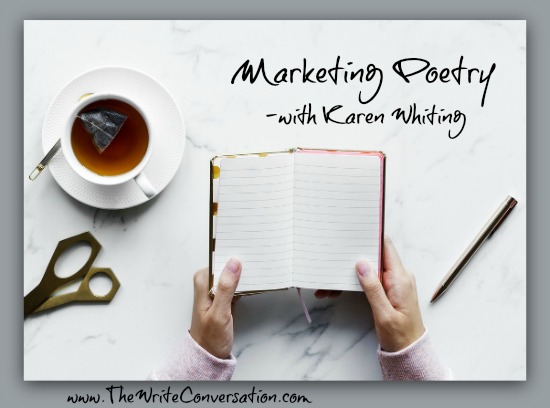by Karen Whiting @KarenHWhiting
Poetry often evokes emotions and that’s what grabs people, so make sure your marketing connects emotionally.
Create saleable materials to accompany your book such as greeting cards, pass it on message cards, and wall hangings. Use lines from your books or your reader’s favorite poem. Sell them at your book table. These are particularly popular if you write poetry on grief or encouragement and offer words for people who don’t know what to say to loved ones struggling emotionally.
Create press releases that include your story. What’s behind the collection of poems or why you write poetry. The personal story helps people connect to you and your poems. Include testimonies of how your poems impacted readers.
Market poems to bloggers. These can be moms, caregivers, travelers, abuse recovery victims, or anyone with whom your words resonate. Think of what would touch each targeted blog audience and write a poem to fit (tired, busy moms, caregivers who want to capture past memories, victims who want release for their past experiences, travelers reminiscing about a trip). Also consider what holidays really connect with the blog’s audience and write a poem for that special occasion. Also consider poetry for a blog connected to fund raisers, such as a poem about double Dutch for the American Heart Association’s Jump Rope for Heart fund campaign.
Frame your Amazon author page to reflect your poetry and focus. Write your bio as a poem. Use keywords that connect with reader needs and reveals your poetry’s focus (hope, loss, love, nature, uplifting, beauty, self-help, sports, etc.)
Take advantage of social media. Use Pinterest to share a few poetic lines with a great photo and do the same with Instagram. Combining rhythm and images draws in readers. Do Facebook live with the right setting behind you or create a a PPT of images while you read to post.
Submit to literary journals to build your credentials as a poet worthy to be read. At the same time avoid scam contests where publishers earn money by accepting all submissions and then charging winners high prices for copies. Study the craft. Building credentials and a body of work can lead to becoming a state poet laureate and more widespread recognition.
Stage your poems for an art show or readings. Check out music to accompany readings and find free art, or team up with an artist or photographer to illustrate your poems. Check with libraries and museums for displays and readings. Think wider. One poet in Miami had her poems about the city painted on sides of buses. Another poet who liked geography created an ABC work covering all the states and many museums exhibit her show. For school programs, I created poem skits for children with props they can hold up as they read various lines of the poem.
Pitch page layouts to magazines. A single poem or even a few may not make it into a magazine due to space limitations. But a page spread that includes a poem and focuses on a reader need will catch an editor’s attention. So, the caregiver poet could write a poem focused on relief from someone helping them and include a tip list of ways to help a caregiver. Or, after a great trip, poems that match a photo snapped with a sidebar of thing to do in that location could sell. These can be pitched to the appropriate magazines. Submit poems to your local newspapers too, that reflect your community’s area or upcoming event.
Use word of mouth and mail. Many poets write special Christmas poems they include in their holiday cards. If you do that, add in an extra copy to be passed on that includes your website and send a copy to your local newspapers.
For children’s poets connect with literacy and promote benefits of poetry for children. Poetry promotes social interaction, coordination (action and finger poems), rhythm, music, and reading skills (word families, phonetics, phonemic awareness, alliteration, etc.). My children’s poetry book, 102 Wiggly Bible Rhymes and Rhythms, includes a page of benefits of rhyme and tips on teaching rhymes. Connect with literacy programs, parenting groups, and librarians and offer a program that promotes reading. Remember big companies buy words for children to print in small spots like cereal boxes.
Add a little humor to your poetry because humor sells. If you can bring smile or giggle to someone they will remember your words. Try to write a few poems that focus on a funny incident (Casey at the Bat, Good Fences Make Good Neighbors) or look at the lighter side of a struggle or holiday. Those poems will garner attention and may end up going viral.
The time has come,” the poet said,
“To share so many things”
Of rhymes and poems and chosen words
For readings and flings
And how our days are taken up
With sales promotion brings
TWEETABLES
Karen Whiting (www.karenwhiting.com) is an international speaker, former television host of Puppets on Parade, certified writing and marketing coach, and award-winning author of twenty-five books for women, children, and families. Her newest book, The Gift of Bread: Recipes for the Heart and the Table reflects her passion for bread and growing up helping at her grandparent’s restaurant.


Wow! Thanks, Karen. Great timing, too. More like this, please.
ReplyDeleteJay Wright; Upstate, SC
Thanks. I try to write hat will be useful. If you have a topic you'd like addresses, please let me know.
DeleteSending this to a new writing friend. Thank you so much Ms. Karen. Your timing could not have been more perfect. God's blessings ma'am.
ReplyDeleteThanks for sharing!
DeleteGreat ideas!
ReplyDelete